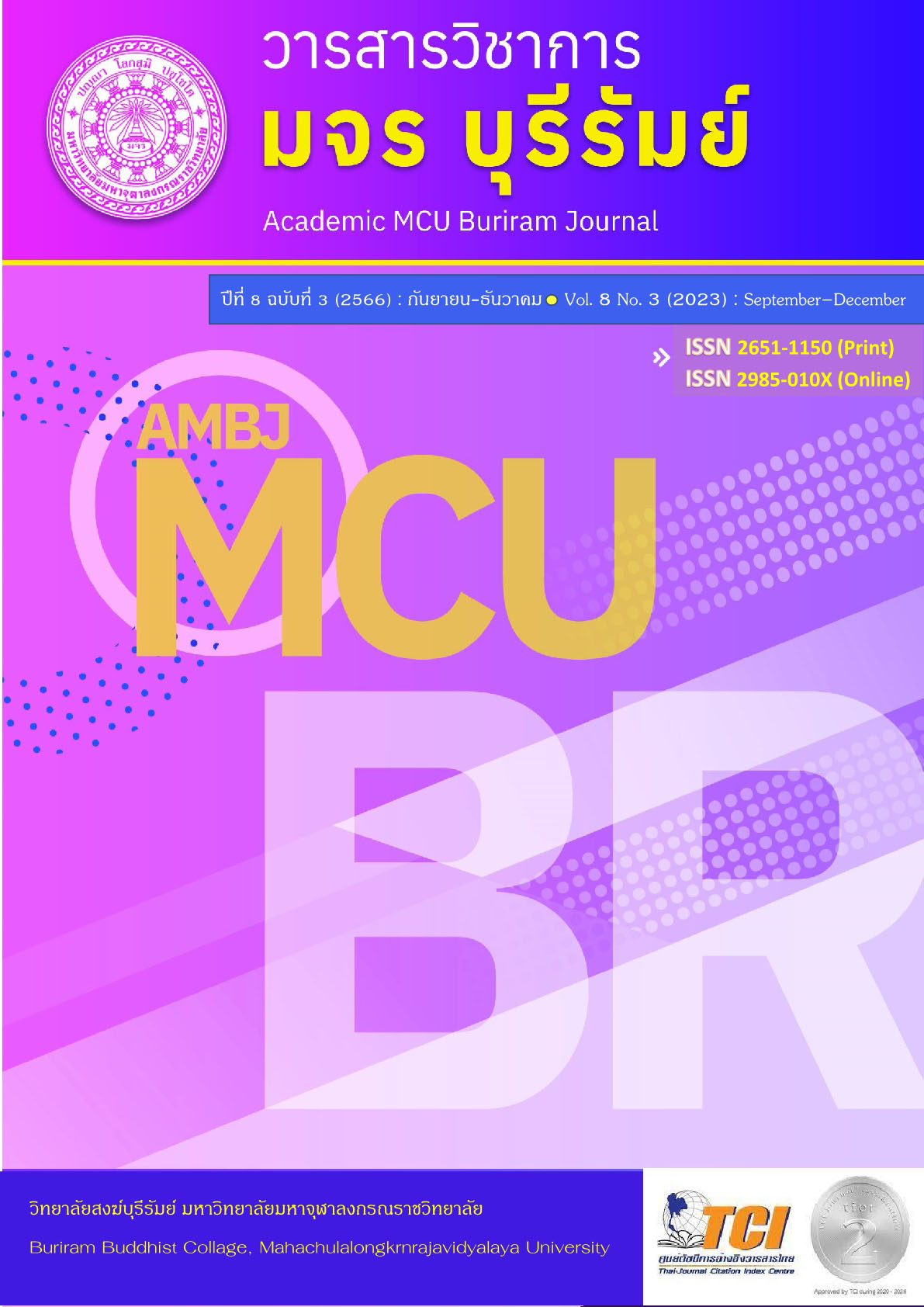A Buddhist Self-Control Approach to Reduce Gambling
Keywords:
Buddhist Self-Control Guidelines, Gambling ReductionAbstract
Gambling is a normal activity that is played a lot both legally and illegally. It is a social stimulus that drives changes in brain biology and cognitive psychology. affects the behavior of players in sociology Gambling creates fun from losing and winning results. Many people become addicted to gambling because they cannot control their perceptions. There are many ways to control emotions, thoughts and behaviors. Buddhist knowledge when applied will be another way to help people reduce gambling problems in their lives, namely: 1) Helps control internal and external behavior, namely emotions, thoughts, feelings and expressions. To be conscious with the principle of heedlessness, 2) to help control the senses involved in gambling activities, having eyes, ears, body and mind with the principle of organic consciousness, and 3) to help control thoughts. To be aware of gambling activities in various dimensions with the Yonisomanasikara Principle. With these 3 principles, a person can behave according to the power of mindfulness. To control oneself physically, verbally and mentally in choosing or not choosing to involve gambling activities. Both the real world and the online world.
References
กนกวรรณ มะโนรมย์ และคณะ. (2561). วิถีพนันวัยใส: กรณีศึกษาเด็กและเยาวชนที่ถูกจับกุมด้วยคดีการพนันในภาคอีสาน. รายงานวิจัยฉบับสมบูรณ์. ศูนย์ศึกษาปัญหาการพนัน คณะเศรษฐศาสตร์ จุฬาลงกรณ์มหาวิทยาลัย.
จุฑามาศ แหนจอน. (2558). สมองกับอารมณ์: มหัศจรรย์ความเชื่อมโยง. วารสารราชพฤกษ์, 13(3), 15-16.
ธีดารัตน์ พันทวี วงศ์ธนะเอก. (2563). การพนันคือปัญหาสาธารณสุข. รายงานศูนย์ศึกษาปัญหาการพนันปี 2563. กรุงเทพมหานคร: โรงพิมพ์เดือนตุลา.
พรจิรา ปริวัชรากุล. (2559). แกะรอยหยักของสมอง มองผลกระทบของการพนัน. พิมพ์ครั้งที่ 2 ฉบับปรับปรุงแก้ไข. กรุงเทพมหานคร: บริษัท สหมิตรพริ้นติ้งแอนด์พับลิชชิ่ง จำกัด.
พระพรหมคุณาภรณ์ (ป. อ. ปยุตฺโต). (2551). การพัฒนาจริยธรรม. พิมพ์ครั้งที่ 5. กรุงเทพมหานคร: บริษัท พิมพ์สวย จำกัด.
พระพรหมคุณาภรณ์ (ป. อ. ปยุตฺโต). (2559). พจนานุกรมพุทธศาสตร์ ฉบับประมวลธรรม. พิมพ์ครั้งที่ 34. กรุงเทพมหานคร: มูลนิธิการศึกษาเพื่อสันติภาพ.
มหาจุฬาลงกรณราชวิทยาลัย. (2539). พระไตรปิฎกภาษาไทย ฉบับมหาจุฬาลงกรณราชวิทยาลัย. กรุงเทพมหานคร: โรงพิมพ์มหาจุฬาลงกรณราชวิทยาลัย.
วัฒนา สุกัณศีล. (2562). เรื่องความเชื่อการพนันและหวย. รายงานวิจัยฉบับสมบูรณ์. ภาควิชาสังคมวิทยาและมานุษยวิทยา มหาวิทยาลัยเชียงใหม่.
วิทยากร เชียงกุล. (2562). เสพติดพนัน : ความใหญ่โตของปัญหาและแนวทางแก้ไข. พิมพ์ที่โรงพิมพ์เดือนตุลา. ศูนย์ศึกษาปัญหาการพนัน จุฬาลงกรณ์มหาวิทยาลัย.
ศศิวุฑฒิ์ วงษ์มณฑา. (2562). การออกแบบชุดการเรียนรู้ "เท่าทันการพนันและเหตุผลวิบัติของนักพนัน" เพื่อสร้างภูมิคุมกันให้กับเด็กและเยาวชนไทย. รายงานวิจัยฉบับสมบูรณ์. ศูนย์ศึกษาปัญหาการพนัน.
ศูนย์ศึกษาปัญหาการพนัน คณะเศรษฐศาสตร์ จุฬาลงกรณ์มหาวิทยาลัย. (2563). รายงานศูนย์ศึกษาปัญหาการพนันปี 2563. กรุงเทพมหานคร: โรงพิมพ์เดือนตุลา.
สมเด็จพระพุทธโฆษาจารย์ (ป.อ.ปยุตฺโต). (2561). พจนานุกรมพุทธศาสน์ ฉบับประมวลศัพท์. พิมพ์ครั้งที่ 32. กรุงเทพมหานคร: สหธรรมมิก.
สมเด็จพระพุทธโฆษาจารย์ (ป.อ.ปยุตฺโต). (2565). พุทธธรรมฉบับปรับขยาย. การพิมพ์ครั้งแรกของฉบับข้อมูลคอมพิวเตอร์ ครั้งที่ 55.
สมโภชน์ เอี่ยมสุภาษิต. (2562). ทฤษฎีและเทคนิคการปรับพฤติกรรม. พิมพ์ครั้งที่ 9. กรุงเทพมหานคร: สำนักพิมพ์จุฬาลงกรณ์มหาวิทยาลัย.
Downloads
Published
How to Cite
Issue
Section
License
Copyright (c) 2023 Academic MCU Buriram Journal

This work is licensed under a Creative Commons Attribution-NonCommercial-NoDerivatives 4.0 International License.
ทัศนะและความคิดเห็นที่ปรากฏในบทความวารสารฉบับนี้ถือเป็นความรับผิดชอบของผู้เขียนบทความนั้น ไม่ถือเป็นทัศนะและความรับผิดชอบของบรรณาธิการ





